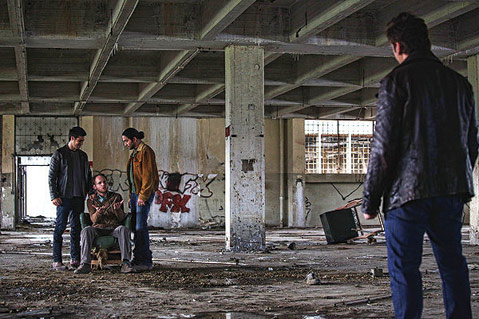Review: Big Bad Wolves
Lior Ashkenazi, Tzahi Grad, and Doval'e Glickman star in a film written by Aharon Keshales and Navot Papushado, and directed by Keshales.

A heinous crime may be the backdrop and set up of this harrowing but occasionally blackly comic Israeli film, but the specifics of a little girl’s brutal murder are less central to the story than the intense and misguided pursuit of justice and revenge, even at the expense of truth. Big Bad Wolves has a theater-like storytelling strategy, in which the mise-en-scène narrows its obsessive focus to the processes and persecutions of those affected and made irrational by the slaughter of innocents. We’ve been to this place recently in cinema, through the wrongly-accused characters premises of Prisoners and the Danish film The Hunted, which variously deal with the extreme prejudice of those even suspected of crimes against children, and the psychological knife-twisting of using and rationalizing torture as a method of finding justice. Of course, the story is larger than this particular, fictional setting; it’s a relevant microcosm of contemporary, post-9/11 life at large.
In this film, directed by Aharon Keshales, all dramatic dynamics and locations lead to the claustrophobic quarters of a basement, where a mild-mannered school teacher (Rotem Keinan) we presume is innocent, is subjected to slow-brewing torture tactics. To put a grisly point on the goal of the torture, it’s a “bring me the head of the slain girl” endgame. The primary persecutor/self-appointed vigilante prosecutor (Tzahi Grad) chillingly and gradually exacts his truth-extraction schemes in the basement of horrors, and his own father joins in the gleefully sadistic games. As the plot thickens, we recognize the extreme measure and loaded emotions of characters who are all fathers of young daughters.
Not surprisingly, aside from its generally strong buzz amongst the critic faction, Big Bad Wolves is much beloved by Quentin Tarantino, whose own recent films — especially Inglourious Basterds and Django Unchained — deal with the power of words and deceptively civil banter more than mere pulpy ultra-violence to get under our skin. Tense-yet-eloquent dialogue and little joybuzzer jolts of dark humor ease the complex pain at the core of a story about things that go very dark and malevolent in the basement. Think of it as a squalid, metaphorical basement of human discourse.



